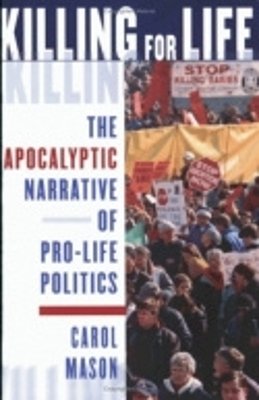11%OFF
Stock image for illustration purposes only - book cover, edition or condition may vary.
Killing for Life
Carol Mason
FREE Delivery in Ireland
Description for Killing for Life
Paperback. Num Pages: 264 pages, 8. BIC Classification: JFMA; JPW. Category: (G) General (US: Trade); (P) Professional & Vocational; (UP) Postgraduate, Research & Scholarly; (UU) Undergraduate. Dimension: 229 x 153 x 17. Weight in Grams: 374.
How can those who seek to protect the "right to life" defend assassination in the name of saving lives? Carol Mason investigates this seeming paradox by examining pro-life literature—both archival material and writings from the front lines of the conflict. Her analysis reveals the apocalyptic thread that is the ideological link between established anti-abortion organizations and the more shadowy pro-life terrorists who subject clinic workers to anthrax scares, bombs, and bullets.
The portrayal of abortion as "America's Armageddon" began in the 1960s. In the 1970s, Mason says, Christian politics and the post-Vietnam paramilitary culture popularized the idea that legal abortion ... Read moreis a harbinger of apocalypse. By the 1990s, Mason asserts, even the movement's mainstream had taken up the call, narrating abortion as an apocalyptic battle between so-called Christian and anti-Christian forces. "Pro-life violence of the 1990s signaled a move away from protest and toward retribution," she writes. "Pro-life retribution is seen as a way to restore the order of God. In this light, the phenomenon of killing for 'life' is revealed not as an oxymoron, but as a logical consistency and a political manifestation of religious retribution."
Mason's scrutiny of primary sources (direct mail, internal memoranda, personal letters, underground manuals, and pro-life films, magazines, and novels) draws attention to elements of pro-life millennialism. Killing for Life is a powerful indictment of pro-life ideology as a coherent, mass-produced narrative that does not merely condone violence, but anticipates it as part of "God's plan."
Show Less
Product Details
Publisher
Cornell University Press United States
Place of Publication
Ithaca, United States
Shipping Time
Usually ships in 7 to 11 working days
About Carol Mason
Carol Mason is Associate Professor of English and Women's Studies at Oklahoma State University.
Reviews for Killing for Life
"Carol Mason has given us something new and important—an account which makes killing for life comprehensible, a logical outgrowth of millennialist ideology. She manages to do this in a way that treats millennialist thought and pro-life violence seriously and respectfully without romanticizing or justifying the perpetrators, and without falling into a simplistic clash of absolutes analysis."
Marlene Gerber Fried, ... Read moreHampshire College "Killing for Life is a groundbreaking analysis of the narrative and rhetorical strategies used by the 'prolife' movement in the U.S. Far from simply pointing to the absurdity or revulsive nature of various highly publicized prolife strategies (from murder of abortion-providers to throwing blood and alleged fetus parts on bystanders), Mason shows how this branch of the new right has radically reshaped the entire framework of political debate about the body and its use and women's right to control the destiny of their own bodies. Unlike other writers, who view the new right as a fringe conspiracy, Mason shows the continuity between abortion foes and neo-liberal critics of the welfare state. This book is essential reading for those concerned with democratic processes and with the rights of women and minorities."
Cindy Patton, author of Globalizing AIDS "Not only does Carol Mason provide an intricate history of the pro-life movement, but, in a book that should be required reading for anyone concerned with national politics, she also shows how central that movement's intense grassroots organizing and worldview was to the contemporary consolidation of right-wing conservatism at a national level, where many of its members are now in powerful positions, both in and out of government. The book is a model of accessibility, in that it is a fascinating read, but the author also develops a technique of reflexivity, in which she traces theoretical concepts such as textuality, narrative, cultural logics, and the political unconscious, and then, by way of interviews and archival material, anchors them in meticulously rigorous and concrete historical descriptions and contexts."
Linda Kintz, University of Oregon Show Less

